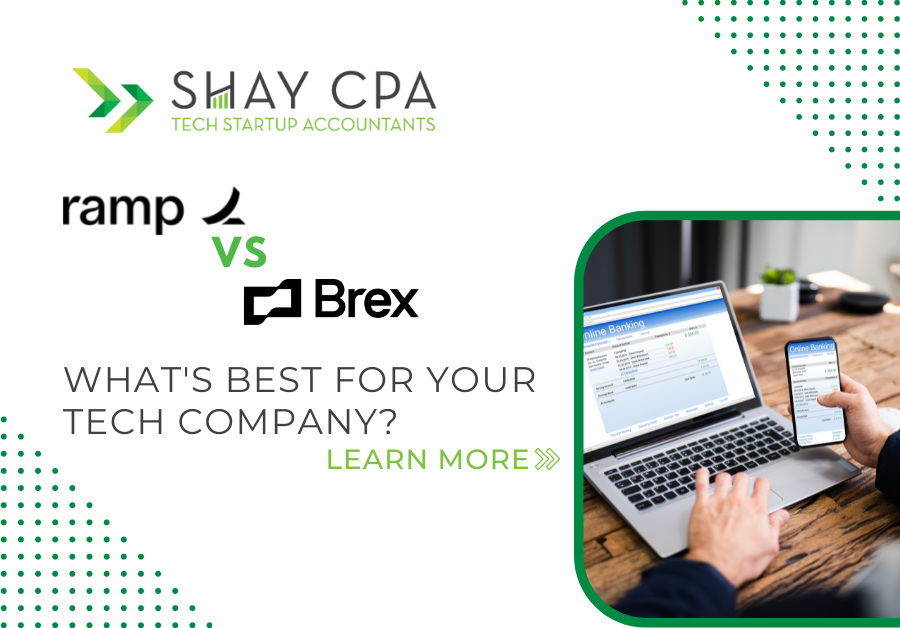If you’re looking for a solution to power your startup’s fintech stack, we’ve got good news. Relatively new players in the game bring streamlined options paired with better insights to help power your growth.
You might have heard of two of the leaders: Ramp and Brex. They offer similar products — corporate credit cards paired with spend management tools — but they have some differences worth calling out.
Our team at ShayCPA thinks both offer a lot of value to startups, but we want to help you hone in on the best solution for your specific needs. To do that, we compared the two.
The basics of Brex
While Brex started as a company issuing corporate credit cards, they’ve scaled significantly. Today, the decacorn offers “payments, cards, capital, and spend management all in one place.” Let’s break that down.
Brex corporate cards
As you’d expect from that info, Brex still offers a corporate credit card. In fact, they allow you to issue unlimited virtual and physical cards to your team without any personal guarantee on your end. You can choose from two types of Brex cards:
- Paid daily, which essentially functions as a rewards-earning debit card that pulls from your Brex Cash balance
- Paid monthly, which Brex says comes with a spend limits up to 20 times higher than traditional corporate cards
The paid-monthly Brex card requires an application. Your startup will need to meet certain size and revenue requirements to be eligible.
With the paid-daily Brex card, you can earn up to eight reward points for every dollar spent. You earn one less reward point with the paid-monthly card.
For tech startups using the paid-daily card, Brex offers tailored rewards:
- 8x on rideshare
- 5x on travel, you book through Brex
- 4x on restaurants
- 3x on recurring software
- 3x on Apple purchases made through the Brex rewards portal
- 1x on everything else
Brex business accounts
Brex is unique in that it’s not a bank, but it can essentially function as one for your startup. Through Brex Cash, you can store deposits with their partner banks, giving you access to the FDIC insurance you’d get with a traditional bank. Alternatively, you can invest your deposits in a government money market mutual fund where they can earn a small yield. Either way, there’s no minimum deposit to start your Brex Cash account.
With your Brex account, you can instantly access revenue from Square, Amazon, Stripe, Shopify, and PayPal.
Brex spend management
As a spend management tool, Brex lets you manage up to eight accounts, allowing you to separate investor funds out easily. You can make deposits and schedule payments from within Brex’s dashboard and mobile app. Brex also allows you to track expenses more easily, matching receipts and syncing expense data.
Other things you should know
Brex offers integration with the rest of your fintech stack (e.g., QuickBooks, Gusto, Xero, Slack).
With a Brex business account, bill pay can be done from your banking dashboard seamlessly.
Need support Brex offered 24/7 chat support.
Ramp 101
Now valued at $3.9 billion, Ramp has already cemented its place on the fintech landscape despite being launched in 2019. They blend corporate cards, bill pay functionality, and integration for your accounting capabilities.
One main difference, though: Ramp requires their customers to have $75,000 in a U.S.-based business account.
Ramp corporate cards
Like Brex, Ramp also offers unlimited cards without any personal guarantee from you. If you choose physical cards (they also offer virtual ones), you can brand them for your startup. They claim to offer spending limits up to 20 times higher than the industry standard.
Within the Ramp solution, you can easily see and manage all of your cards and the individual spending for each.
Ramp offers 1.5x unlimited cashback for everything you spend on their cards. They don’t charge any foreign transaction fees.
Ramp bill pay
Ramp can streamline paying your vendors, whether you pay via a card, check, or ACH transfer. Their solution leverages AI to extract key invoice details and process them for easier, faster review. Within Ramp, you can also establish and automate approval processes.
Ramp spend management
Ramp also automates expense tracking and reporting, even going so far as to automatically capture receipts and categorize purchases as they happen. Plus, your team can submit additional details via SMS or email.
Once you set up your guidelines and approval policies, Ramp can flag anything that doesn’t align, minimizing the review time your team needs to put in.
Plus, with integrations from Gmail to QuickBooks, Ramp can pull in all of the relevant data, then clean it for you. You can expect books backed by reliable data and complete with audit trails.
Other Ramp features
Ramp integrates with QuickBooks, Xero, Sage Intacct, Gusto, Slack, and NetSuite and offers real-time reporting functionality. In fact, their reporting includes AI-powered analysis to identify trends, duplicate transactions, unclaimed rewards, and other options for keeping more money within your startup.

Ultimately, the right fintech solution for you depends on what your startup wants and needs. If you need to establish the equivalent of a business account, consider Brex. If you’re looking to streamline and clean up your financial data, reporting, and processes, Ramp’s tools can deliver.
Here at ShayCPA, the majority of our clients use Brex but we have experience with and recommend both. Ramp and Brex are both scaling in different ways, too, so it’s worth keeping an eye on their movement.
For help exploring these two options — along with the other financial solutions that could fit your startup — we’re here. Contact us at ShayCPA today.

